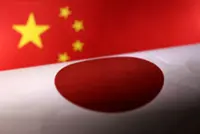LONDON: Drugmaker AstraZeneca plans to turbo-charge its already substantial Chinese business through a new drug development joint venture with a state-backed private equity fund.
The stand-alone business, Dizal Pharmaceutical, will be owned equally with the Chinese Future Industry Investment Fund (FIIF), which is part-owned by the China State Development & Investment Corporation, the companies said on Monday.
By getting into bed with a local player, AstraZeneca aims to ride a wave of regulatory reform in China’s pharmaceuticals sector and get new drugs to market more quickly.
It dovetails with Beijing’s desire to see more “discovered-in-China” drugs as the country targets life sciences for growth. The FIIF’s remit in pharmaceuticals is to promote such local drug development and manufacturing.
China is now the world’s second-largest drugs market after the United States, with more cases of cancer and diabetes than any other nation, creating a big opportunity for local and international drug companies.
Recently, the China Food and Drug Administration has taken steps to accelerate new drug approvals, while local funding agencies are also moving faster to agree payments for innovative drugs, albeit with some tough negotiations on pricing.
The reforms have triggered growing interest in China as a centre for drug development, reflected in a wave of initial public offerings and licensing deals with foreign drug companies.
In the case of the new joint venture, Dizal will incorporate all the scientific and technical capacity of AstraZeneca’s existing Innovation Center China (ICC) in Shanghai, including exclusive rights to three drugs in pre-clinical development.
Dizal's chief executive will be Xiaolin Zhang, previously head of the ICC, and all ICC staff have been invited to join the new company.
In exchange for the AstraZeneca assets, FIIF will provide development funding and expertise in establishing strategic partnerships in China. There are no upfront payments.
As and when new Dizal drugs reach the market, AstraZeneca is likely to receive income from the venture as a dividend, a company spokesman said.
China has been a bright spot for AstraZeneca as it struggles with patent losses on past blockbuster medicines and the country now accounts for 15% of group product sales - a far higher proportion than at other big pharma companies. China sales were US$2.14 billion in the first nine months of 2017.
The success is in contrast to British rival GlaxoSmithKline, which is still suffering falling Chinese sales after a bribery scandal that landed it with a record fine in 2014.
Chief executive Pascal Soriot said AstraZeneca’s new joint venture would reinforce its strong position in China, while also creating opportunities to supply future China-discovered drugs to international markets.
“We aim to accelerate the local discovery and development of innovative, affordable medicines for patients in China and around the world,” he said. - Reuters





